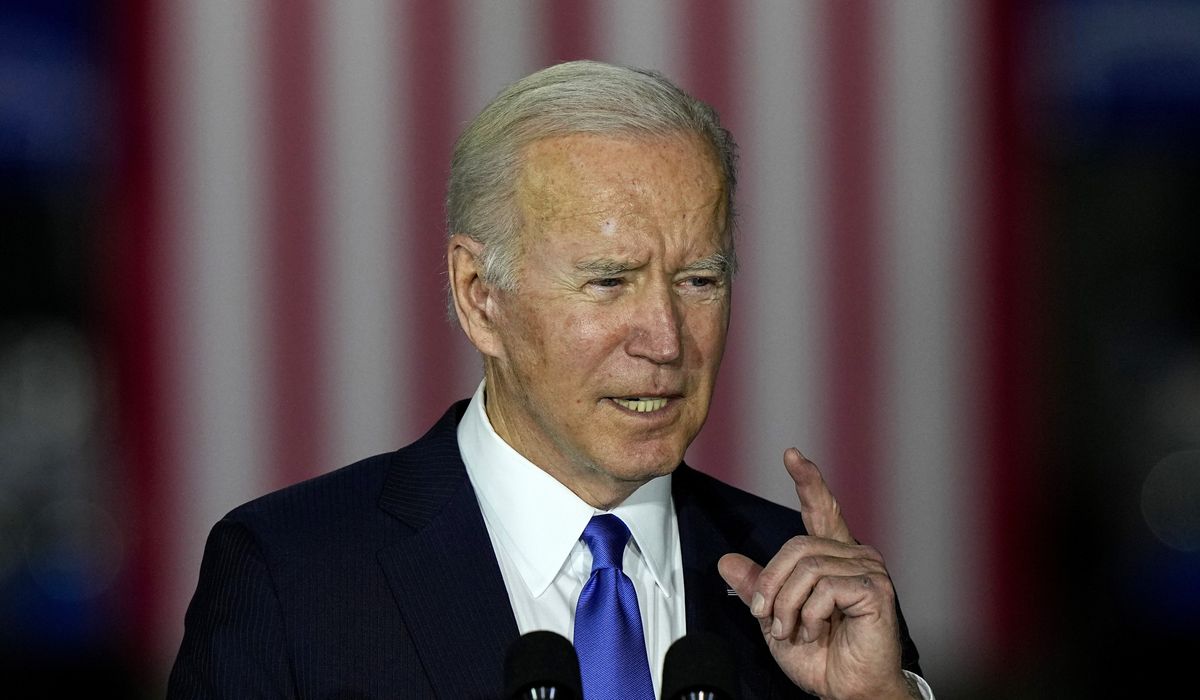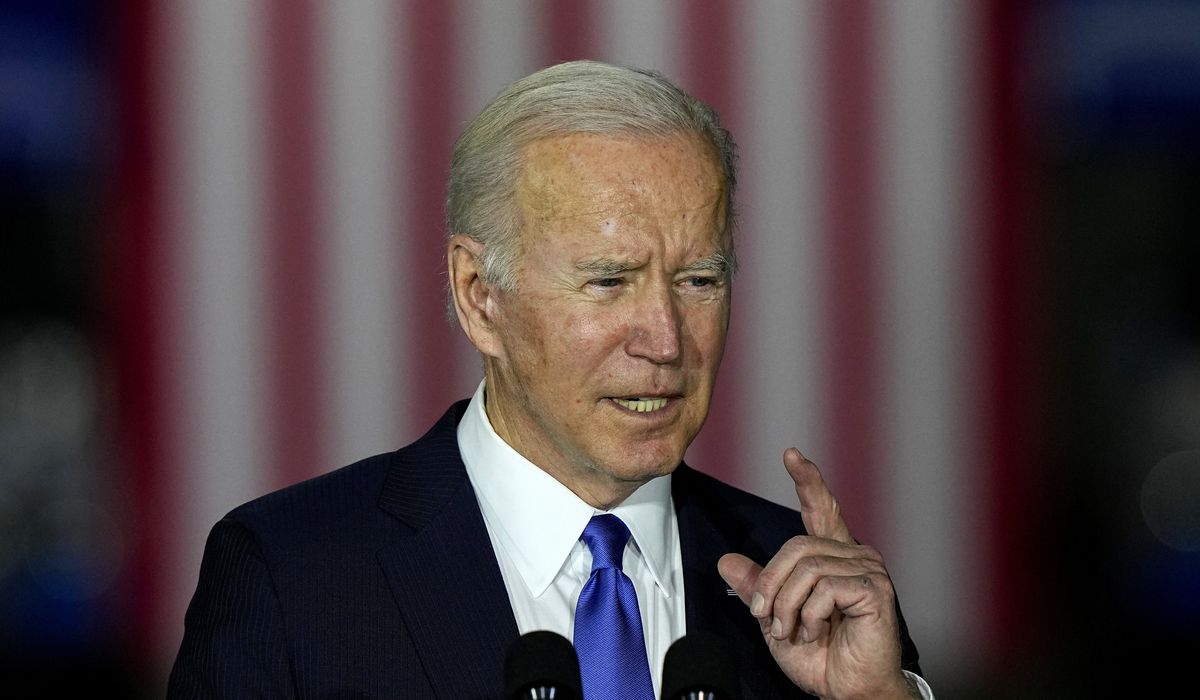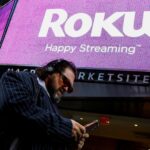
A public relations blitz aimed at energizing the American public about President Biden’s big infrastructure win has fallen on deaf ears with voters, who are tuning out recycled speeches and low-wattage events.
Mr. Biden on Wednesday took his infrastructure roadshow to Kansas City, Missouri, where he made a fifth speech highlighting his $1.2 trillion infrastructure plan since it cleared Congress on Nov. 6.
The president is aiming to capitalize on his legislative victory by emphasizing how the infrastructure plan will deliver for Americans.
But Americans aren’t paying attention. Even mainstream networks are opting out of news coverage.
After all, repairing roads, bridges and railroads takes years or even decades. Without an immediate payoff, the plan isn’t visible enough to shift voters’ attention away from the COVID-19 pandemic, rising crime, inflation and the supply chain crisis.
CNN, a normally reliable stable for Mr. Biden, didn’t bother to cover the president’s speech. Instead, they talked about the Russian military buildup along the Ukraine border and Tiger Woods’ return to golf.
“Nobody is paying attention to these speeches,” said Jimmy Keady, a Republican Party strategist. “Biden is talking about transportation, but Americans don’t care. They are struggling to do basic things like buying groceries and putting presents under the Christmas tree.”
In Kansas City, Mr. Biden used worn-out jokes and applause lines.
It was the third time in five speeches he took a jab at former President Donald Trump for repeatedly declaring “infrastructure week” to drum up support for a bill that never materialized.
For the fifth consecutive speech, Mr. Biden told the audience that he is a capitalist but urged the wealthy and corporations to “pay their fair share.”
He repeated a vivid story that was debunked this summer about his friendship with an Amtrak conductor. The man died before the events in the story took place. That was the second time out of the past five speeches he told the yarn.
“What is he going to talk about?” Mr. Keady said of the oft-repeated phrases. “He keeps talking about transportation and infrastructure, but Americans are struggling. He can give the same speech a thousand times, and it doesn’t mean Americans are going to care anymore.”
Democratic Party strategists say Mr. Biden needs to repeat his speeches to get his message to stick.
“One thing I’ve learned in the political messaging business is that people don’t pay attention,” said Brad Bannon, a Democratic pollster. “The only way you can make a point in a crowded political environment is repetition. There is no such thing as too much repetition in politics.”
Another reason Mr. Biden is hammering the infrastructure theme is that his plan is outpacing him. The roads-and-bridges program remains popular among voters crucial to Democrats’ hopes of preventing a rout in next year’s midterm elections.
An ABC/Washington Post survey taken days before the infrastructure bill cleared Congress found that 63% of voters supported it, yet only 35% approved of Mr. Biden’s job performance.
A Quinnipiac University poll taken around the same time showed 57% of Americans supported the infrastructure bill but a dismal 36% approved of Mr. Biden.
“I think what they are trying to do is use the bill’s popularity to lever the president’s approval rating,” Mr. Bannon said.
Republican Party strategist Ford O’Connell said the word “infrastructure” was polling so well among voters that the White House began referring to Mr. Biden’s roughly $1.75 trillion social welfare and climate bill as “human infrastructure.”
The White House originally planned to pair Mr. Biden’s public speeches with local press interviews in cities he visits.
Mr. Biden has traveled to Baltimore, Detroit, New Hampshire, Minnesota and Kansas City since the infrastructure deal cleared Congress, but he has spoken about the bill only with a Cincinnati TV station. It’s the only local TV interview he has given more than 10 months into his administration.
“We’ve seen press operations be effective when they reach out of Washington,” said Doug Heye, a Republican Party strategist. “Obama did this extremely well, and he always knew one of the questions would be a layup.”
White House press secretary Jen Psaki last week blamed the president’s full schedule for his lack of television interviews.
“I would very much like that to happen,” Ms. Psaki told reporters. “We are always competing with time on the schedule. I’m going to be honest: His schedule has been quite packed. But he would like to do it. We would like to get it on the schedule.”
The White House has given local reporters opportunities to ask Ms. Psaki questions via video conference during Friday press briefings, but technical glitches have plagued those efforts.
While press engagement at the local level remains low, the White House has been hectoring national media outlets into more favorable coverage of the president.
CNN reported that three top White House officials are secretly meeting with major news outlets to persuade them to present more favorable coverage of the president.
The officials also are seeking positive stories about job creation, the economy and the supply chain. They insist that the economy is in better shape than it was last year, according to the report.
White House officials attending the meetings are said to be National Economic Council Deputy Directors David Kamin and Bharat Ramamurti and ports envoy John D. Porcari. Although CNN did not name any of the news outlets, it said the presidential aides had spoken with anchors, producers and reporters.
Republican and Democratic strategists alike told The Washington Times that pressuring media was a sound practice, but Mr. O’Connell said the effort was too little and too late.
“The White House is trying to turn the tide, but they think they are facing a small wave when they are facing a tsunami of public opinion,” he said. “Biden has lost the trust of the American people and lost the trust of the media, who have lost credibility because they spent 10 months pushing the White House’s lies.”








